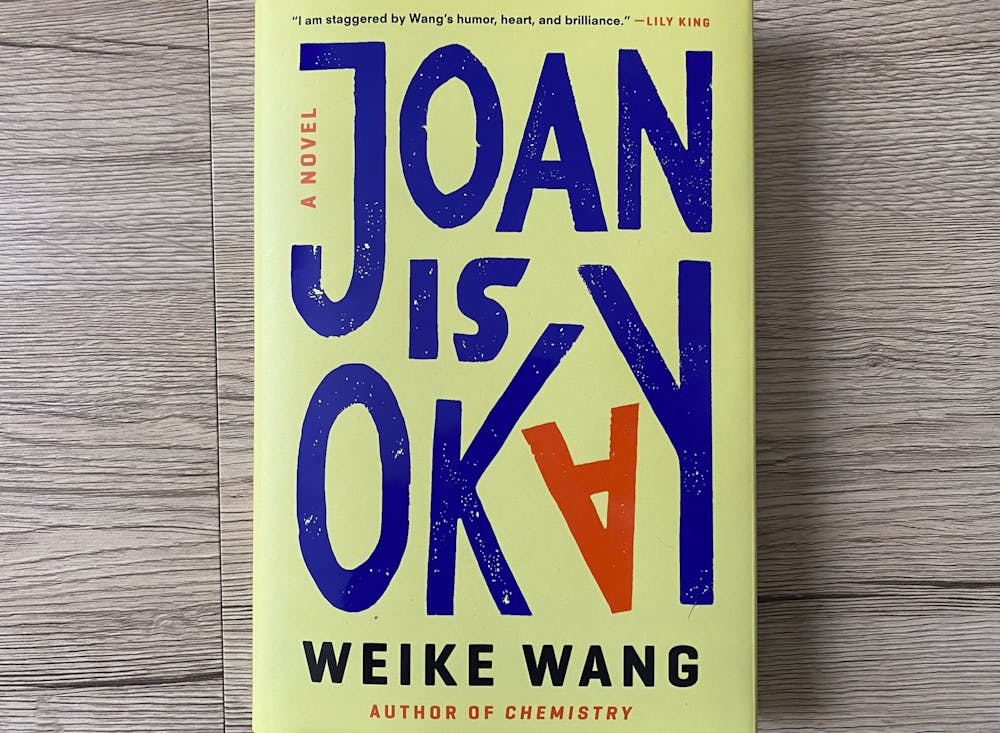The spine of Weike Wang’s latest novel has its title printed vertically down the cover. Each of the letters comprising “Joan is Okay” is set in type, except for the A in its last word. The A shows an upside down illustration of a woman with a wide stance, so her legs make the natural shape of a capital A.
Like Wang’s main character, the illustrated figure is just slightly off-kilter. “Joan is Okay” is a story about Joan, a somewhat-detached rockstar surgical attending based in New York, who is forced to navigate a life in which seemingly everyone wants to change her.
Written in first person, readers gets to know Joan, who is characterized by her boss at the hospital as a “a new breed of doctor, brilliant and potent, but with no interests outside work and sleep.”
Joan describes herself as a cog in the machine. And that’s OK — because she likes machines. Sometimes she likes them more than people.
Wang’s writing style gives Joan a distinct voice. She uses succinct, almost clipped sentences, a style which creates the perception of Joan as a frank, no-nonsense individual.
This personality is off-putting to the rotating characters in Joan’s life.
Her brother, Fang, wants her to trade her fast-paced, workaholic life for a suburban one in Connecticut. Fang’s wife, Tami, “asked why wasn’t (Joan) more worried about these practical matters when people who never marry become outcasts, and a woman isn’t a real woman until she’s had a child.”
Joan responds to this insertion more calmly than I, for one, would. Wang writes: “Tami, these are my choices, not yours, I said. How you would handle a situation is not always mine.”
Wang uses the book’s blunt prose to acknowledge the tension between different parts of our identities. Joan grapples with this in one chapter, asking herself whether it is more difficult to be “a woman? Or an immigrant? Or a Chinese person outside of China?”
Joan is forced into conversations which often leave readers cringing. For example, why does new neighbor and middle-aged white man Mark feel like he can wrangle Joan into co-hosting a party with him — despite her objections — so much so that she comes home one day to find half of the building inside her apartment?
“After a brief hello with everyone and hearing a sentence or two from them about what they did, I left the apartment at around 8:00 p.m., as the party was going on,” Wang writes.
My first thought reading this line was “OK, relatable,” as someone who occasionally sets an alarm on her watch for a finite number of minutes that she must stay at a party before bailing.
My second was a sense of righteous indignation. Who does Mark think he is? I asked myself after this chapter — which followed a series of interactions where he oversteps boundaries and comments on various aspects of Joan’s life.
“Not being steeped in the same culture as he was did not make (Joan) someone who needed his help, and that he acted like it was his job to improve (her) was both presumptuous and wrong,” Wang expertly points out.
Every character in the book seems to feel entitled to an opinion on how Joan is living, on who she is. The title of the novel seems outwardly fairly clear: Joan is OK.
At least, for the most part. She does contract the coronavirus at her hospital, her mother — in the U.S. staying with Fang after her husband dies — cannot get a flight back to China, where she desperately wants to return, and she has to set new boundaries for keeping unwanted opinions out of her life.
I prefer my fiction to be fictional, so Wang’s use of the ongoing coronavirus pandemic in the story wasn’t my favorite aspect of the book. It does, though, offer a timely and well-written look into the realities of public health workers.
Wang makes readers think about their internal biases against people who don’t choose to fit into the mold society imposes upon them. This alone makes “Joan is Okay” an effective use of storytelling.




